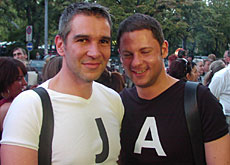Gay couples fight for equal rights

The people of Zurich will vote on Sunday on whether to grant greater equality to homosexual couples.
Those calling for a “yes” vote are hoping that the issue will subsequently be taken up at a national level – paving the way for gay marriages.
Since most laws relating to marriage and family are handled by the national authorities, the cantonal vote will not lead directly to gay weddings in Zurich. Nor will homosexual couples earn the right to adopt children.
A “yes” vote would, however, see gay couples being taxed together, as is the case for married couples in Switzerland.
Gay men and women would also be given the automatic right to visit their partners in hospital. At the moment visitation rights are only guaranteed to heterosexuals.
The new legislation would also involve changes in the law relating to foreigners.
If the proposals are backed by the people of Zurich, gay foreigners who have set up home with a Swiss partner would receive the same rights as foreign heterosexuals who have married a Swiss.
Official declaration
For many, though, it seems the most important change will simply be the ability to make an official declaration of their relationship.
During a mass postal vote organised by “yes” campaigners in the run-up to polling day, dozens of gay couples took an early opportunity to get their views across.
“It’s a chance for all of us, I guess,” said Jan, after attending the event along with Claude, his partner of four years.
“It gives us another piece of freedom and I think the time is definitely right.”
“First step”
“It could be the first step towards equality at a national level,” reckoned Claude.
“But for most gay couples it’s just a chance to show that they are really together.”
The formal recognition of gay couples is not just an issue in Zurich. Similar legislation has already been passed in Geneva.
Political campaigns are also under way in Bern, Basel, Neuchâtel, Vaud, Aargau, Lucerne and Ticino.
Tentative proposals are already being studied at a national level, but gay rights campaigners believe approval in Switzerland’s biggest city would help to speed up the process.
“In the end it’s all about getting the same rights at the national level,” insists the organiser of the mass vote, Thomas Haebberli.
“What we need from Zurich is a really high percentage of “yes” votes so that we can move the issue forward.”
Lagging internationally?
As far as gay rights campaigners are concerned, Switzerland is certainly a long way behind in comparison with many of its European neighbours.
Back in 1989, Denmark became the first country to allow registered homosexual partnerships. Similar legislation has since followed in Germany, France, Sweden, Norway and the Netherlands.
In 2001 the Netherlands went on to recognise full gay marriages – the first state anywhere in the world to do so.
Parliamentary approval
Anything other than a “yes” vote on Sunday would certainly be a major surprise. In January, the proposed legislation was approved in the cantonal parliament by 93 votes to 43.
That would have been enough to see the proposals become law if it hadn’t been for a Christian political party, the Federal Democratic Union, which gathered the 5,000 signatures necessary to force a popular vote on the issue.
Party members, who are now urging the people of Zurich to reject the proposal, say they are acting to preserve the sanctity of marriage. They also deny accusations of homophobia.
Christian disapproval
“We are not against gay people and we don’t see them as having lesser value than other people,” insists the party’s cantonal secretary, Daniel Suter.
“But we do disapprove of the lifestyle they have chosen because we think it is dangerous to themselves and a wrong signal to society as whole.”
“Allowing the registration of gay couples would damage society because it would offer young people an equal choice between homosexuality and heterosexuality,” Suter adds.
“That would make a lot of youngsters insecure about their identity.”
Whatever the result of Sunday’s ballot, the battle lines are likely to remain drawn for the likely national debate.
Unsurprisingly perhaps there is not much love lost between those whose views on the nature of love itself are so very different.
“I don’t know whether the people of Zurich have become more tolerant to us in general,” said one young lesbian when asked what she thought of the campaign’s chances.
“It stands to reason that all my friends and associates are very supportive. After all, I wouldn’t really want to know someone who couldn’t accept the way I am.”
swissinfo, Mark Ledsom in Zurich
Prospective couples would have to live together for at least six months before being registered.
After registration they would receive the same rights and obligations as married couples in regard to taxation and social welfare.
The partnership can be ended immediately by mutual consent or by just one partner if there has been a separation period of at least two years.
The partnership would also end automatically if one partner leaves the canton of Zurich or gets married.

In compliance with the JTI standards
More: SWI swissinfo.ch certified by the Journalism Trust Initiative








You can find an overview of ongoing debates with our journalists here . Please join us!
If you want to start a conversation about a topic raised in this article or want to report factual errors, email us at english@swissinfo.ch.